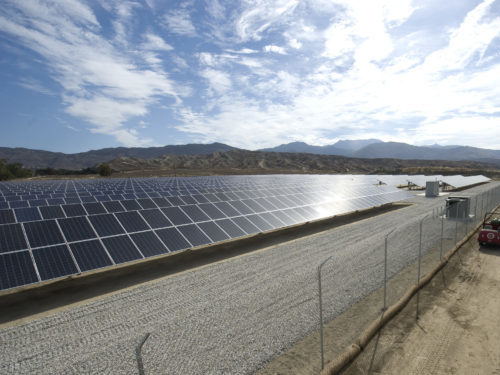The bump in recycling from social influence shows that adopting a social perspective is important to fully realize and achieve higher material recovery.
—Julien Walzberg, NREL
According to the International Energy Agency, over 70,000 solar panels are being installed every hour around the world. This rapid deployment is expected to grow year after year and, as it does, so will the volume of end-of-life modules.
The solar waste recycling programs and current global recycling policies are not prepared to handle the rising influx of panels. A deliberate and regulated plan to ensure that this material is repurposed and recycled properly is necessary to encourage a circular economy and guarantee that the sustainability strides of our industry are not erased through the destructive scrapping of materials.
Photo: Fabtech Solar Solutions
The benefits of solar panel recycling and reuse strategies are not simply to save landfill space and deter toxic waste, but to turn this waste into economic resources. Instead of extracting endless virgin materials, the use of aluminum, glass, silicone, and richer metals such as copper and silver can be resourced in the process, which reduces energy consumption (IPCC, 2013), and conserves scarce natural resources. This becomes extremely important as we continue down the path of powering the world with solar energy.
The solar recycling efforts in the U.S. accomplish its goals only if solar owners/producers actively participate in recycling before the time it takes to legislate their participation.
I know recycling is considered expensive, mainly because it is not an expense companies are used to having. It is much less expensive to landfill the panels which has been an industry practice, not just because of the expense, but also because the scarcity of local recyclers that will take solar panels.
This is changing. Recyclers are scaling up to be able to handle solar panels in larger and larger numbers; but in order for this practice to grow, there needs to be a demand for these services, and we can’t wait until legislation is in place. By the time that happens the number of used/damaged solar panels could reach massive levels, and there won’t be the infrastructure to support the high number of panels that will need to be recycled.
We need to start now
One important factor that can move the needle in the recycling efforts can be seen by looking at studies at what shapes human behavior around the decision to recycle. This may interest you : SPI’s Solarjuice Technology Inc. Files Patent Applications Related to Improving Solar Module Manufacturing Processes.
From the Introduction of this article by Metehan FeridunSorkun on “How do social norms influence recycling behavior in a collectivistic society? A case study from Turkey”, we see:
“Informational influence shapes the behavior through internalization process. Individuals believe that their behavior in a specific circumstance should meet with peers’ approval; hence, they adopt social norms as personal norms. Altruistic behavior models may be useful to examine the informational influence of social norms on recycling behavior; however, these models may fail to capture the normative influence of social norms because individuals may also conform to social norms for their own sake without internalizing the norms. To this end, this research disentangles the informational and normative influences of social norms on recycling behavior. On the theoretical side, this study offers a more detailed examination on the influence of social norms on recycling behavior, while on the practical side, the understanding of how social norms influence recycling behavior enables policymakers to optimize the recycling program design in collectivistic social contexts.”
What this report shows in painfully technical details, is that early adopters help set the trend for others to follow. When PV owners know fellow PV owners who recycle and there is a general positive attitude toward recycling, the rate increases.
Social influence could be our greatest influencer
Solar Magazine: Solar Industry News and Insights
If that is true, what can we do about it? If you have broken or damaged solar panels, refuse to landfill them. Recycle the broken panels and sell the unbroken for reuse and tell everyone you’re doing it, through your marketing, PR, and social media posts. Let your employees know that you have a recycling policy, which they can be proud of. Read also : Dominion Energy Prepares for Grid Challenges, Expands Solar in South Carolina. It’s not just your panels your recycling, but you are influencing others to do it, too. The impact your company makes on this one thing can make a huge difference.
So, taking the words out of Nike’s mouth, “Just do it!” Do the right thing, not because you’re legislated to do it, but because you believe in the part you are playing in the transition to cleaner energy. Your recycling efforts multiply into larger-scale results as you influence others to do it as well. You are, simply, working to create a sustainable world fueled by renewable resources.
Recycle and tell everybody you’re doing it.

